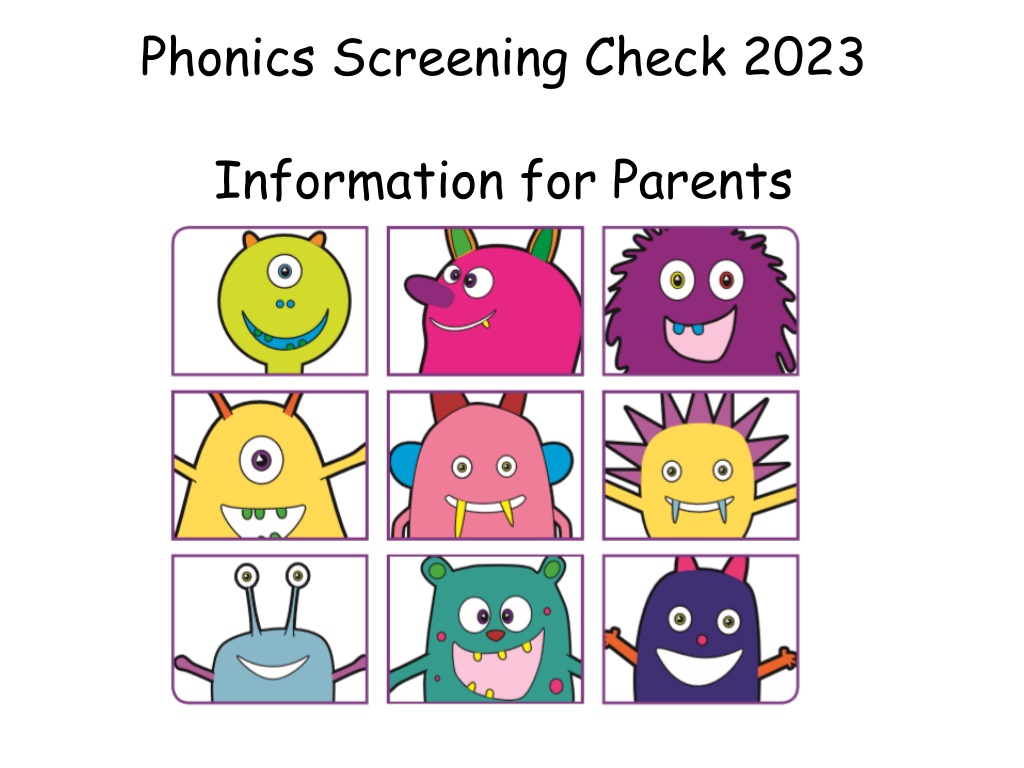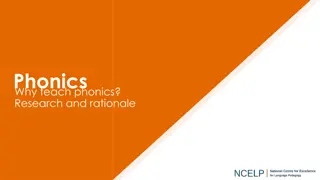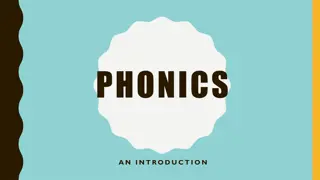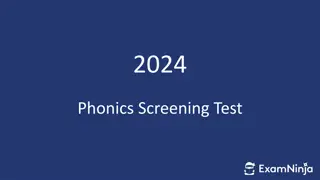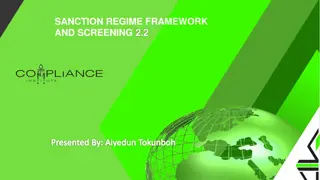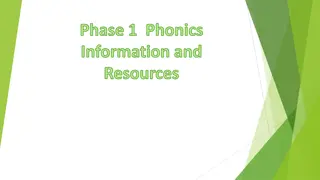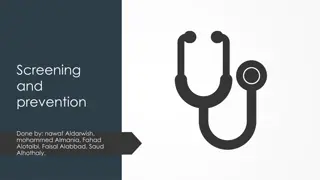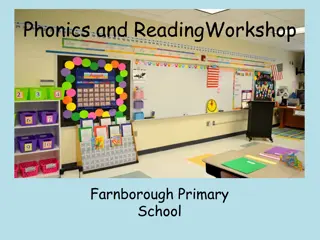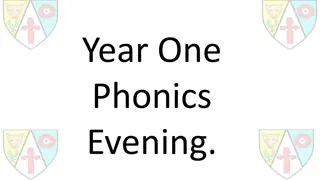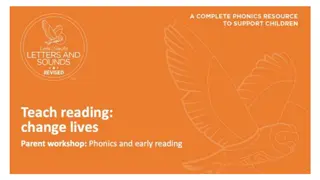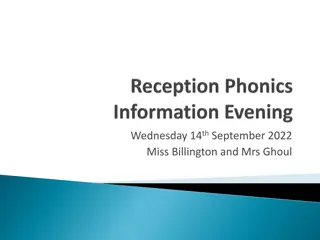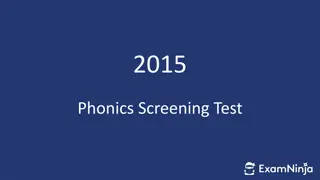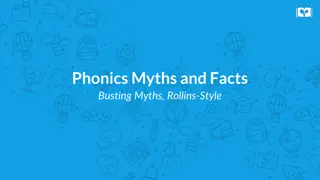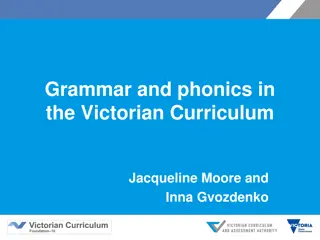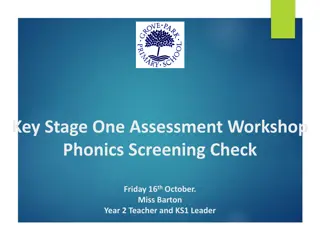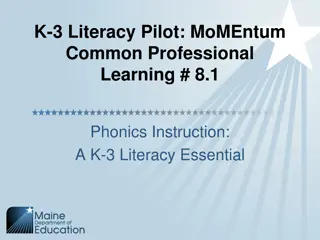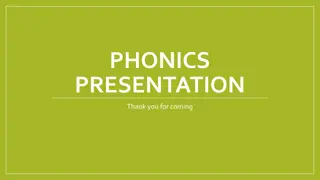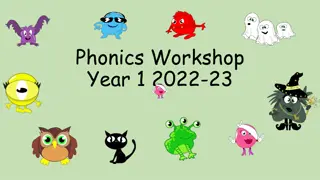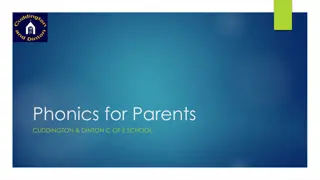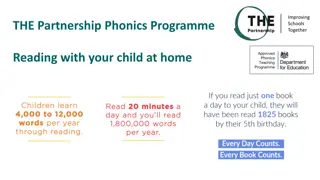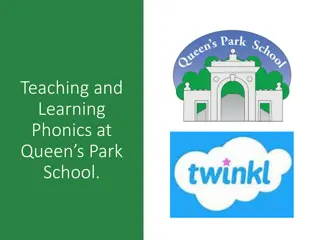The Phonics Screening Check for Parents
The Phonics Screening Check is a crucial assessment for Year 1 and Year 2 students to evaluate their phonic decoding skills. It consists of 40 words, including real and pseudo-words, to determine reading proficiency. This statutory check helps identify children in need of extra support to enhance their reading abilities. Learn all about the check, its structure, who it's for, and when it takes place. Explore sample materials and the skills children must master to meet the screening standard.
Download Presentation

Please find below an Image/Link to download the presentation.
The content on the website is provided AS IS for your information and personal use only. It may not be sold, licensed, or shared on other websites without obtaining consent from the author.If you encounter any issues during the download, it is possible that the publisher has removed the file from their server.
You are allowed to download the files provided on this website for personal or commercial use, subject to the condition that they are used lawfully. All files are the property of their respective owners.
The content on the website is provided AS IS for your information and personal use only. It may not be sold, licensed, or shared on other websites without obtaining consent from the author.
E N D
Presentation Transcript
Phonics Screening Check 2023 Information for Parents
What is the phonics screening check? The phonics screening check is a short assessment to check if individual children have learnt phonic decoding to an appropriate standard. This is one way the children learn to read. The check consists of 40 words, 20 real words and 20 pseudo-words that your child will be asked to read one- to-one with a teacher. It helps to identify the children who need extra help so they are given support by their school to improve their reading skills.
Who is it for? The screening check is for all Year 1 pupils and children in Year 2 who previously did not meet the standard of the check in Year 1. Is it compulsory? It is a statutory requirement for all schools to carry out the screening check. Do children with Special Education Needs have to take the screening check? It should be taken by as many children as possible, and the Government have worked closely with SEN specialists to make this happen.
When does the Phonics Check happen? The phonics screening check takes place in June of each year. This year, the screening checks begin on Monday 12th 2023.
How is the check structured? It will be a short, simple screening check to make sure that all children have grasped basic phonic skills. It is made up of a list of 40 words and non-words, which a child will read one-to-one with a teacher. Half of the words cover phonic skills which tend to be covered in Reception, and half of the words are based on Year 1 phonic skills. The check will contain a mix of real words and alien words (nonsense words). Your child will be told before the check that there will be alien words that he or she has not seen before. We use alien words when we teach phonics, so your child should be know what to look out for.
Sample materials are available on the education.gov.uk website. Below is an example from the 2012 Phonics Screening Test. All papers from previous years are online.
What skills do children need to meet the standard of the phonics screening check? All children need to be able to identify sounds associated with different letters, and letter combinations, and then blend these sounds together to correctly say the word on the page. The same skill is needed whether the word is a real word or a non- word. The words gradually get harder through the check as the combinations of letters become more complicated. Children will also need to recognise alternative sounds in real words, such as y in the word happy having the pronunciation e .
What happens with the scores? After the check has taken place in June, schools will be given the pass mark. The pass mark has always been 32 out of 40. Schools use the information to find ways to support the children who do not reach the score and the result will provide teachers with information to help develop the child s skills in phonics.
Is it stressful? The assessment is age-appropriate, with children sitting with a teacher who they know. Reading one-to-one with a teacher is a familiar activity for Key Stage 1 children. It should be an enjoyable activity for children and takes no more than a few minutes. The children have already done several practise phonics screening assessments, so they are comfortable and know the process.
How do we teach phonics? We follow the Read Write Inc. Scheme. There is a link to this on our school website. If you have any queries or questions, please feel free to speak to Miss Darby or Mrs Worrick.
How can I help at home? Practice a mix of real and alien words
